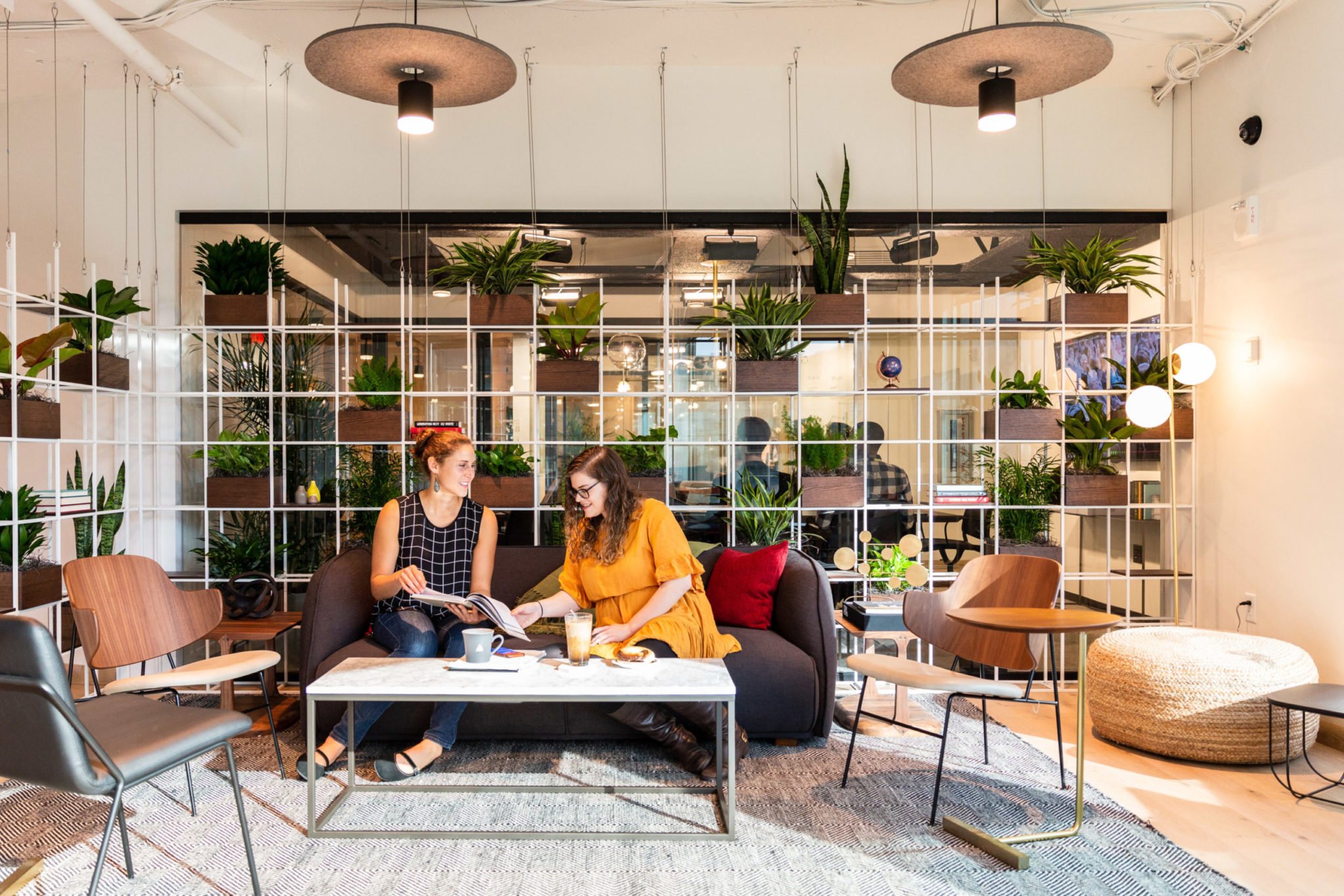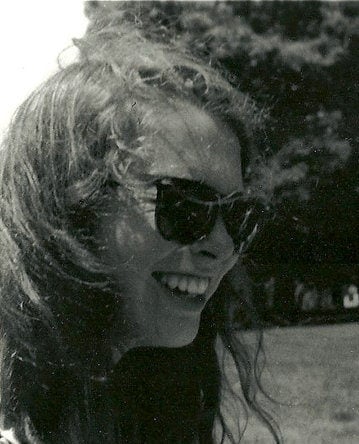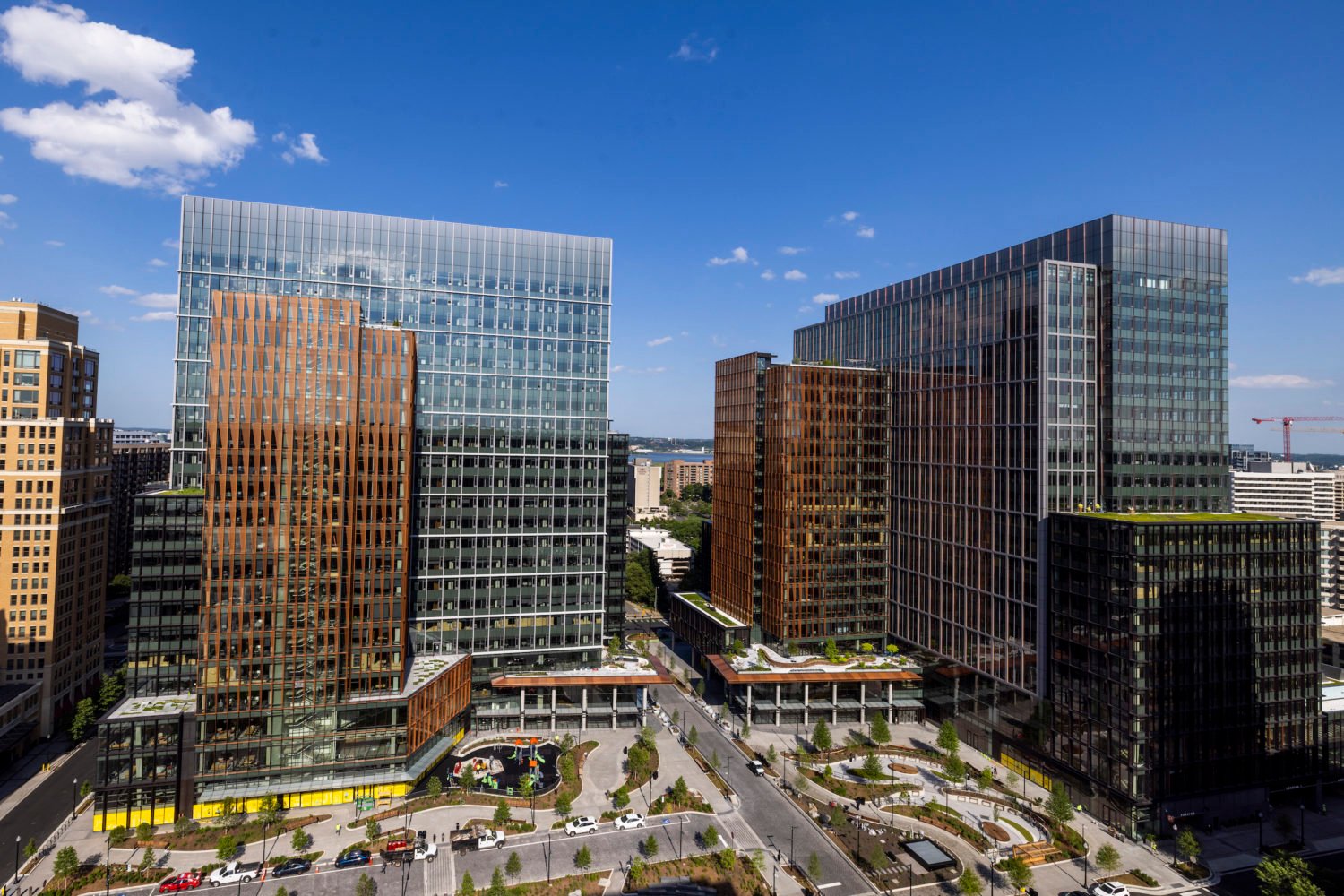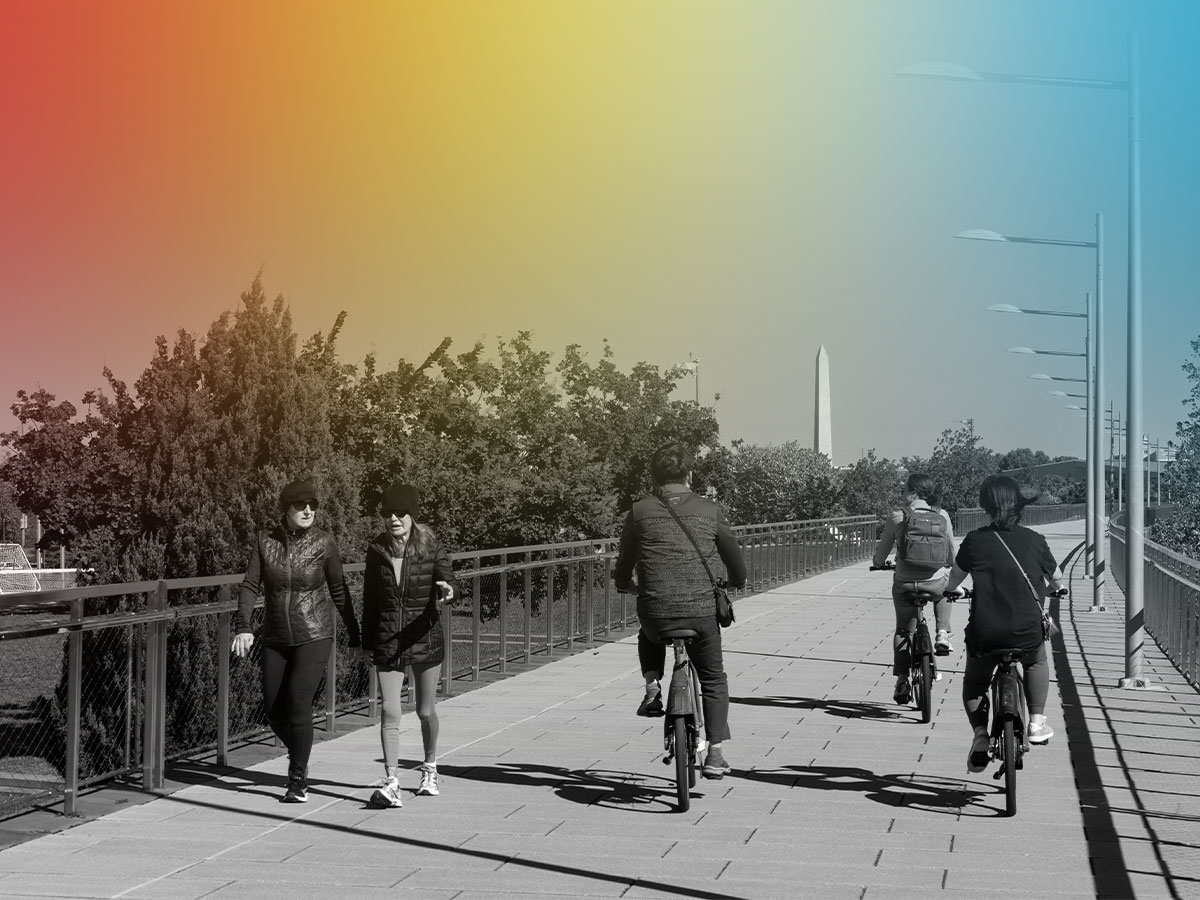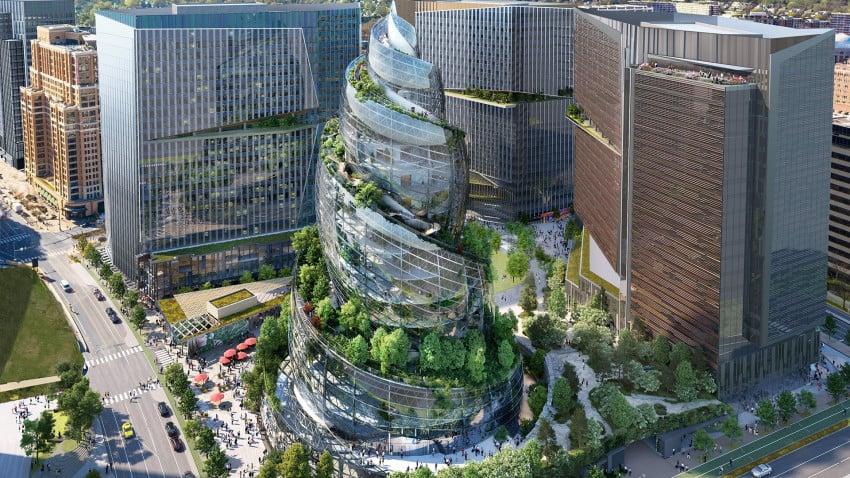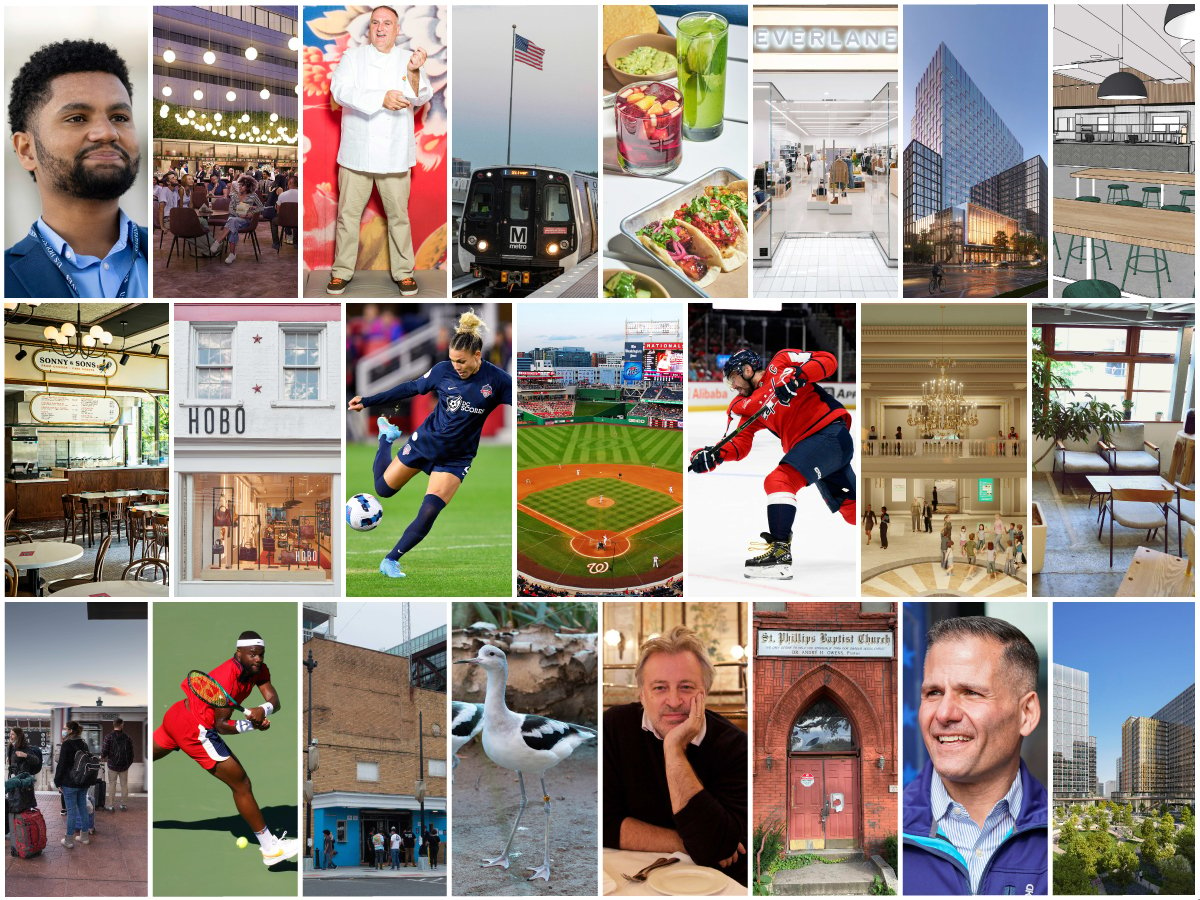Initially, I was most excited about reporting a story on coworking because it meant I got to try coworking. Coworking—in which freelancers or entire companies rent desks or offices short- or long-term in a fully equipped communal space—seemed to consist of spending eight hours in a series of West Elm armchairs, taking breaks between spurts of work to grab cold-brew or chat with the trendy freelancer next to me, then closing my computer at 4 to hit the local beer on tap in the kitchen.
Yet it turns out there’s actually a lot of, well, work going on at these spaces. Sure, they and their perks sometimes get brushed aside with an “oh, those millennials and their toys” sigh. (When I told my baby-boomer father I was writing this story, he asked if coworking spaces stashed pacifiers in the back for all the twentysomethings.) But such spaces now have a serious presence in the country, especially in Washington.
As of last year, WeWork became the largest holder of private office space in the District; all in all, DC counts 2.3 million square feet of coworking space across 81 locations, according to a March report by the commercial real-estate services firm CBRE. This year, the real-estate company JLL named Northern Virginia and DC as two of the country’s top ten areas most likely to see an increase in coworking spaces.
So why is our city home to so many of these flexible-workspace options?
Plenty of reasons, says economist and George Mason public-policy professor Stephen Fuller, who calls DC an “office-oriented economy.” The city’s smaller political groups and nonprofits benefit from the amenities and prime locations that coworking provides, he says—selling points that might be too expensive if a small organization had to rent a full office. Flexible spaces are attractive to startups that could grow rapidly—or crash and burn—and don’t want a long-term commitment. For jobs that change with election cycles, a short-term, less pricey office lease is also appreciated.
Key, too, is Washington’s transformation from an economy dominated by the federal government to one that’s more diverse.
“We have more telecommuting—we have a growing presence of self-employment,” Fuller says. “We have a lot of smaller firms that are technology-intensive, and these spaces’ flexibility may be attractive to them.”
[su_table fixed=”yes”]
Area Locations |
Cost |
Fun Perks |
Vibe |
|
| WeWork | 14 with 7 more in the works | Starts at $390 monthly for membership. | Beer and cold-brew on tap; dogs welcome in some locations; and events—think cheese tastings and workouts with Vida Fitness. | The Penn Quarter location is laid-back and casual. You can take phone calls from a trendy armchair, challenge someone on an old-school video game, or knock off work early and hang by the beer taps. |
| Cove | 4 | $30 day pass; starts at $229 monthly for membership. | By far the best drink options—La Colombe coffee, sparkling water on tap, and a fridge stocked with seltzer, soda, and San Pellegrino. | The Dupont Circle location has a coffee-shop-like main room, with counter seating and booths, but also quiet space and phone booths for getting stuff done. The abundant natural light is hard to beat. |
| Makeoffices | 10 | $35 day pass; starts at $300 monthly for membership. | Vigilante coffee, beer on tap, gym use (for members), a relaxation room with massage chairs, and a recording room. You’ll have to pay to hit the snack supply, though. | The K Street location has nooks and crannies to work in, which you may need—the kitchen area can get pretty packed and loud at lunchtime. (TVs playing the news aren’t the best for focusing, either.) |
| Spaces+ | 2 | Starts at $240 monthly for membership. | Starbucks coffee for $1; laundry service at the NoMa location; bikes to borrow; nap rooms; a patio with foosball; a gym on-site; a barista and cafe offering options such as sandwiches, pastries, and chips. | The coworking area of the NoMa location is small—most of the space is private offices—but it has a social environment, with events such as happy hours, while still keeping things professional (no beer on tap). |
| Convene | 4 | Starts at $350 monthly for membership. | Catered breakfast and lunch; cold-brew coffee and tea, and both sparkling and still kombucha, all on tap; snacks such as Ghirardelli chocolates and Harvest Snaps; on-site catering for events. | The Rolls-Royce of coworking spaces. The Penn Quarter location is beautiful—huge windows, dark-green wainscoting, underground skylights that mimic daylight—and ginormous, at more than 72,000 square feet. |
|
Industrious |
5 with 1 more in the works | Starts at $450 monthly for membership. | Breakfast buffet with options like an avocado-toast bar; afternoon snacks (chips and dip, charcuterie); free seltzer and soda; cold-brew Tuesdays; happy hours; gyms in some locations. | This group, with some 85 locations across the US, straddles professional workspace and glorified hangout. For example, dogs are allowed in some locations, but you won’t see beer on tap. |
[/su_table]
Meanwhile, more traditional office spaces in Washington are catching on to the coworking ethos. “You see a spillover and a change of what’s being offered to the marketplace as a result of this disruption,” says Scott Homa, who heads office research for JLL. “It’s kind of like Tesla putting the pressure on Ford and GM and everyone else to build innovative, high-quality electric cars.”
An example of a legacy office group embracing this mindset is the coworking group Space+, which isn’t backed by a WeWork-like entity but rather the corporate real-estate company WashREIT.
With Amazon HQ2 and Virginia Tech’s Innovation Campus coming to the area, you can expect to hear a lot more about coworking, says Homa: “Tech users tend to be some of the largest consumers of flexible space, so as we start to see both the West Coast tech titans expand their footprint as well as more venture-funded startups and midsized businesses within DC continue to expand, I think the tech sector will be a large source of customer demand for flexible space.”
When I settle into the Penn Quarter WeWork on a Friday, I’m greeted by unlimited cold-brew on tap, mini-fridges of almond milk (millennials love nut milk), a dispenser of fruit water, and a smattering of old-school arcade games. Folks outfitted in overalls and chunky jewelry drift throughout its three floors, which wouldn’t be out of place at a South Beach boutique hotel. And, yes, there is beer on tap.
It may seem unnecessary to provide so many amenities in a space ostensibly dedicated to work, but all the add-ons are a big part of the appeal, says Christopher Campagna, CEO of Braddock Commercial Real Estate Solutions, which focuses on flexible workspace.
“What that affords me [as a small-business owner] is being able to hire that super-bright, highly educated, highly motivated recent college graduate and provide her with a work experience that Google provides,” Campagna says. “It levels the playing field for small and medium enterprises.”
Because the way to an employee’s heart is sometimes through the stomach, coworking spaces have a big emphasis on consumables, in some instances even more so than the high-speed internet or conference rooms.
At the Cove in Dupont Circle, people can help themselves to a fridge filled with seltzer, San Pellegrino, and soda as well as La Colombe coffee and snacks such as Goldfish and pretzels. The MakeOffices downtown boasts Vigilante Coffee and local beers on tap, and the Spaces+ in NoMa has Starbucks drip coffee for a dollar and an in-house barista who will make you whatever you’d like for a small fee.
At the new Convene in Penn Quarter, in a cafe area referred to in Convene-ese as Nourish, cold-brew coffee and tea plus kombucha, both sparkling and still, are available on tap. (The coffee beans are roasted in Brooklyn because of course.) A monthly catered breakfast and lunch is made by the company’s culinary team, and there’s an area Convene plans to use for chef demonstrations or partnerships with local breweries.
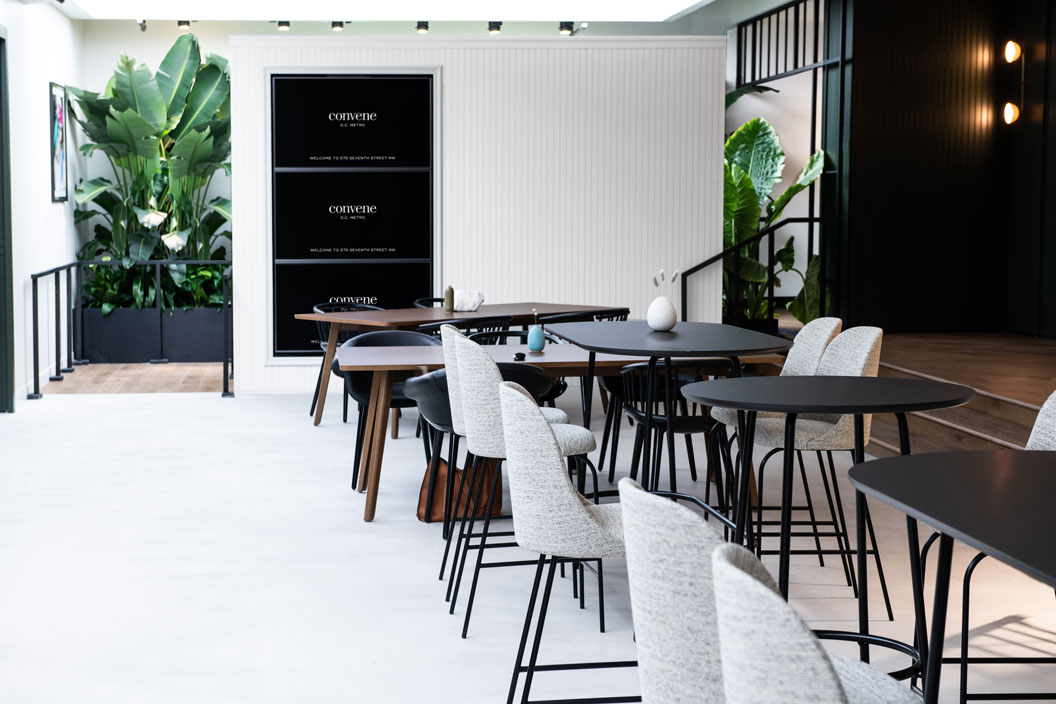
All these perks are just perky enough to almost make you forget you’re on the clock. But with so many spots doing everything they can to cater to clients—“If they say they want wild monkeys, we’re going to figure out how to get wild monkeys,” says Campagna, only half joking—how’s a place to differentiate itself from the others?
Introducing mission-based coworking.
Georgetown’s the Wing doesn’t refer to itself as a coworking space per se but rather as a women-focused social club. However, plenty of ladies work from its curated halls, where chic Insta-darlings take conference calls while sitting in a gallery of local female artists or a library of women-centric literature (organized by color, of course, for the ’Gram). The spot is seen as a proponent of progressive ideology and often hosts speaking events with women including former presidential adviser Valerie Jarrett.
Eaton House, attached to the Eaton hotel, serves a similar vein of liberalism-meets-workforce. The multilevel space, which thinks of itself more as “a vehicle for change” than a coworking spot, its manager tells me, is filled with midcentury furniture and industrial-chic touches. It hosts member events that focus on social justice and activism.
Women-focused Hera Hub, in Friendship Heights, is a less trendy version of the Wing—doctor’s-office decor and zero cold-brew sightings—and Two Birds, in Tenleytown, provides childcare while you work.
Other groups are making use of underutilized spaces: Locale sets up drop-in coworking pop-ups at places such as the Heurich House or Cherry Blossom Creative, WorkChew allows remote workers to post up at otherwise-empty restaurants throughout the day, and WorkStrive does the same, only at exercise studios—and includes a workout class in your daily rate.
The haters will hate (see: my dad), but coworking spots won’t be pouring their last cup of kombucha anytime soon. Apparently, it’s not all about the almond milk and curated events: Those who fill coworking spaces experience a stronger sense of community, are more likely to connect with their employer, and find their work more meaningful than those in traditional office settings, according to a series of Harvard Business Review studies.
I have to admit: Even tedious tasks such as transcribing interviews were more pleasant with an unlimited supply of LaCroix, and I certainly didn’t mind hanging out on a leather couch all day instead of in my cubicle. Although I spent only a few hours at each of these spaces, I see how they could lead to a happier work experience and higher productivity.
And yes, if you’re wondering—I did stuff some of the free snacks into my backpack as I left.
This article appears in the November 2019 issue of Washingtonian.

